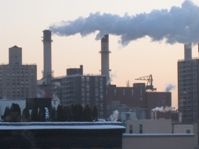Norwegian pension fund report urges chemical, transport industries to reduce carbon emissions
Facing losses from falling BP stock prices, the Fund has found it necessary to push for sustainability reforms across several industries on its board.

 International chemical, petrol and transport industries should invest in carbon reduction, according to a new report released by the Norwegian Government's Global Pension Fund-Global.
International chemical, petrol and transport industries should invest in carbon reduction, according to a new report released by the Norwegian Government's Global Pension Fund-Global.
On August 13, 2010, the Fund published a report showing that these industries were not doing enough to reduce cabon emissions.
The Norway fund is comprised of petrol and gas investments and controls 0.5 percent of the world equities, or US$455 billion, making it the second largest fund behind the United Arab Emirates Pension Fund. Prior to the survey, it had lost over five percent of its assets on British Petrol share prices.
Nonetheless, the report found that petrol and power companies were the greenest of 476 businesses surveyed across six industrial sectors.
The report gathered information from public sources such as the Carbon Disclosure Project, but Yngve Slyngstad, the head of the Fund, claimed that these were insufficient for research purposes.
Accordingly, the Fund will gather information from additional private sources. Pension funds are important players in carbon emissions debates. On average, pension funds control around 76 percent of their country's GDP.
In the US and the UK, they amount to 25 and 13 percent of equity markets respectively. However, the structures of government and energy industries which comprise the fund currently favour focus on short term financial gain over sustainability.
In addition to changing life expectancies, which have resulted in the crumbling of the pension 'pyramid' for developed nations, the financial crisis has given pension funds a new perspective on sustainability.
Pension funds around the world have less money to provide pensions for more people. These vulnerable funds therefore have good reason to take the threat of climate change to economic growth as a central issue.
But the Norwegian Fund has more leeway to address these issues than most pension funds because of the lower population of the country in comparison to its relatively large investment gains.
This has made the Fund a target for questions about ethics, questioning its history of funding controversial industries including arms and tobacco. Many arms firms have already been excluded on these grounds.
In response to public scrutiny, the Fund has excluded many offenders within the international mining industry. The Barrick Gold Corporation was excluded as well as the Freeport McMoRan Copper & Gold Inc, for extensive environmental degradation rat the Porgera Gold Mine in Papua New Guinea, as was Rio Tinto Group, an Australian mining company, and finally Vedanta Resources Plc, an Indian mining company.
One of the excluded companies, DRD Gold Limited of South Africa, was re-instated to the fund after reforming their damaging practices. Slyngstad stated that, the Fund is not threatening to exclude any company as a result of the report.
He claimed that the Fund only wanted to promote investment in climate efficiency, particularly chemical and transport firms. However, in light of excluded firms, the threat is implicit.
Precedents for corporate social responsibility already exist: funds in the UK have been developing ethical reporting systems under the Companies Act in 2006, which requires directors to look at social and environmental responsibility when reporting.
Sustainability is an issue not only of risk for funds, as implied by falling BP stock prices, but of opportunity to pre-empt market forces as the demand for green energy skyrockets to potential profits.
Therefore it is not surprising that the Fund should be encouraging chemical and transport industries to improve energy efficiency.
Last year, the Fund's report on child labour caused Monsanto, Bayer, Syngenta and DuPont to form a partnership, which Slyngstad believes has led to 'quite a bit of improvement'.
The Fund anticipates similar partnerships combating climate change to form in the above industries in the coming year.
Author: Cristina Brooks | Climate Action
Image: Salim Virji | Flickr




